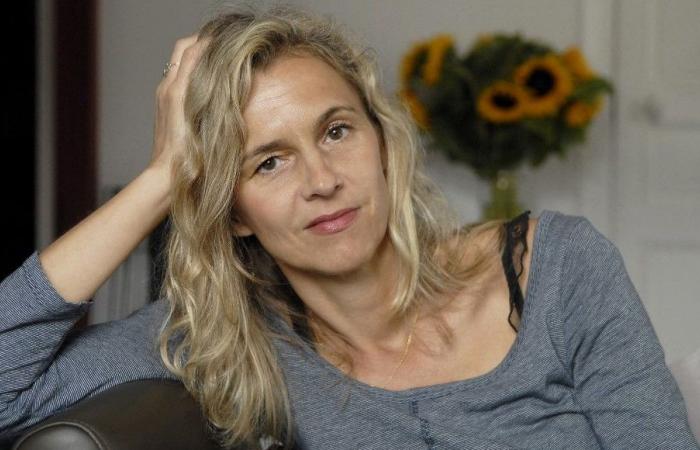Us and me, Nothing stands in the way of the night, Based on a true story… novel after novel, Delphine de Vigan has become one of the most read French authors, for the second time in two years. She says her own text this Saturday, at the Philharmonie de Paris, as an introduction to a concert by the Orchester National d’Ile-de-France in the 7th symphony by Bruckner. Delphine de Vigan also created her very first play, published by Gallimard.
“I said yes straight away, before I found myself immersed in some writing throes, because I thought: ‘but how am I going to approach this?’ This was Delphine de Vigan’s reaction when, last year, the Orchester National d’Ile-de-France asked her to write a text and say it during a concert, as an introduction to the 5th symphony Mahler. “I was afraid that the musicians would say to themselves: ‘They’re putting a writer in our hands!’she adds. And not at all, it was a very nice meeting, I was very well received.” So well received that it repeats the experience, this week, with the same orchestra and, this time, the 7th symphony by Bruckner. The aim of these introductory texts and his presence on stage is above all to bring another audience to the concert, to create a bridge between books and music, and also to put into words the imprint that music leaves on us. . A carte blanche which leaves the writer completely free, in the middle of the silence of the Philharmonie de Paris: “It’s an absolutely incredible place, an incredible moment of vertigo. The text lasts 12 minutes, which is both short and long. What I felt the first time was a very great freedom, because that these texts are not printed. They obviously speak of the composer, but are at the same time quite personal. If the text was printed, I would probably not have written what I wrote.
Reading aloud
Writing for a concert is one thing, reciting is another. But Delphine de Vigan likes the exercise, perhaps because it allows her to express the musicality of the text to which she is so sensitive in writing. “I once said that I wrote because I didn’t know how to play musicconfides the author. I look for music a lot in writing, rhythm, the musicality of words… I work on orality, assonance. Maybe this is a way to compensate for this frustration. As a little girl, I wanted to study piano. My mother learned it quite late, and we heard her play a lot. I myself wanted to work with a teacher: it lasted a few weeks then my mother fell ill. We radically changed our lives, it was like a dream stopped.” She therefore did not become a musician, but reconnected with this part of herself through words, and the pleasure of reading her own texts out loud. “I have had the opportunity to do this several times, she says*, notably with the singer La Grande Sophie and a musical reading that we had worked on. We had mixed our two worlds, songs and texts. This show was given for quite a long time, around fifty dates throughout France and abroad. And since then, I really enjoy reading my own texts out loud.”
Tell the background
In parallel with this musical project, Delphine de Vigan published her very first play with Gallimard. “The extras” deals with these “additional actors”, as they are defined in their employment contract, people who have intrigued the author for a long time. “I’ve always been interested in the background, she said, and I have often noticed, while watching films, that my eye is drawn to these people who, at the same time, are part of the setting and make it credible, but who must also be seen without being too visible. I wanted to take an interest in them, to tell a little about who they are, where they come from, with quite quickly the idea that it is a striking metaphor for society, social hierarchy and existence.” Delphine de Vigan portrays various characters, inspired by several figurations on which she was hired to write the play: the one who dreams of a small role, the one who has been an actor and has twisted a little, those who like to slip into lives other than their own, those who defend the “proles of cinema”, an expression which recurs in the text. “What struck me, probably more today than a few years ago, she explains, is that figuration brings together people from very different backgrounds. Of course, there are actors who are there to supplement their intermittent hours, but there are also retirees who need to supplement their income, students who need to earn a little money, people who are in a certain precarious situation. And then people who just want to get closer to the magic of cinema. It is this variety that I wanted to tell in the piece. I wanted the piece to be a moment of meeting between different extras who find themselves on a film set, on a more or less well-controlled shoot.” A moving text, the writer’s tribute to her love of live performance. She even admits a hidden desire, that of one day writing an opera libretto.
Meeting with Bruckner – Friday November 22 at 8:30 p.m. at Rungis Theater and Saturday November 23 at 3 p.m. at the Paris Philharmonic
The extrasGallimard.






